Related Research Articles

Charles John Huffam Dickens was an English writer and social critic who created some of the world's best-known fictional characters and is regarded by many as the greatest novelist of the Victorian era. His works enjoyed unprecedented popularity during his lifetime and, by the 20th century, critics and scholars had recognised him as a literary genius. His novels and short stories are widely read today.

John Anthony Burgess Wilson, who published under the name Anthony Burgess, was an English writer and composer.

A sequel is a work of literature, film, theatre, television, music or video game that continues the story of, or expands upon, some earlier work. In the common context of a narrative work of fiction, a sequel portrays events set in the same fictional universe as an earlier work, usually chronologically following the events of that work.
David John Lodge CBE is an English author and critic. A literature professor at the University of Birmingham until 1987, some of his novels satirise academic life, notably the "Campus Trilogy" – Changing Places: A Tale of Two Campuses (1975), Small World: An Academic Romance (1984) and Nice Work (1988). The second two were shortlisted for the Booker Prize. Another theme is Roman Catholicism, beginning from his first published novel The Picturegoers (1960). Lodge has also written television screenplays and three stage plays. After retiring, he continued to publish literary criticism. His edition of Twentieth Century Literary Criticism (1972) includes essays on 20th-century writers such as T. S. Eliot. In 1992, he published The Art of Fiction, a collection of essays on literary techniques with illustrative examples from great authors, such as Point of View, The Stream of Consciousness and Interior Monologue, beginning with Beginning and ending with Ending.
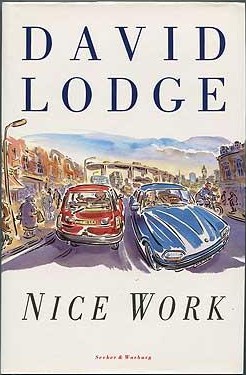
Nice Work is a 1988 novel by British author David Lodge. It is the final volume of Lodge's "Campus Trilogy", after Changing Places (1975) and Small World: An Academic Romance (1984). Nice Work won the Sunday Express Book of the Year award in 1988 and was also shortlisted for the Booker Prize.
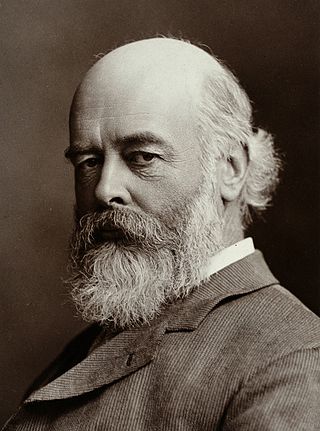
Sir Oliver Joseph Lodge, was a British physicist and writer involved in the development of, and holder of key patents for, radio. He identified electromagnetic radiation independent of Hertz's proof and at his 1894 Royal Institution lectures, Lodge demonstrated an early radio wave detector he named the "coherer". In 1898 he was awarded the "syntonic" patent by the United States Patent Office. Lodge was Principal of the University of Birmingham from 1900 to 1920.
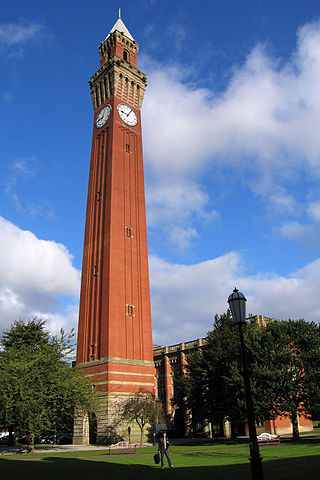
The Joseph Chamberlain Memorial Clock Tower, or colloquially Old Joe, is a clock tower and campanile located in Chancellor's court at the University of Birmingham, in the suburb of Edgbaston. It is the tallest free-standing clock tower in the world, although its actual height is the subject of some confusion. The university lists it variously as 110 metres (361 ft), 99 metres (325 ft), and 100 metres tall, the last of which is supported by other sources. In a lecture in 1945, Mr C. G. Burton, secretary of the University, stated that "the tower stands 329 ft [100 m] high, the clock dials measure 17 ft [5.2 m] in diameter, the length of the clock hands are 10 and 6 ft [3.0 and 1.8 m], and the bell weighs 5 long tons [5.1 tonnes]".

Sir Malcolm Stanley Bradbury, was an English author and academic.

Historical fantasy is a category of fantasy and genre of historical fiction that incorporates fantastic elements into a more "realistic" narrative. There is much crossover with other subgenres of fantasy; those classed as Arthurian, Celtic, or Dark Ages could just as easily be placed in historical fantasy. Stories fitting this classification generally take place prior to the 20th century.
Changing Places (1975) is the first "campus novel" by British novelist David Lodge. The subtitle is "A Tale of Two Campuses", and thus both the title and subtitle are literary allusions to Charles Dickens' A Tale of Two Cities. It is the first novel, followed by Small World (1984) and Nice Work (1988).

Small World: An Academic Romance (1984) is a campus novel by the British writer David Lodge. It is the second book of Lodge's "Campus Trilogy", after Changing Places (1975) and before Nice Work (1988).

The culture of Birmingham is characterised by a deep-seated tradition of individualism and experimentation, and the unusually fragmented but innovative culture that results has been widely remarked upon by commentators. Writing in 1969, the New York-based urbanist Jane Jacobs cast Birmingham as one of the world's great examples of urban creativity: surveying its history from the 16th to the 20th centuries she described it as a "great, confused laboratory of ideas", noting how its chaotic structure as a "muddle of oddments" meant that it "grew through constant diversification". The historian G. M. Young – in a classic comparison later expanded upon by Asa Briggs – contrasted the "experimental, adventurous, diverse" culture of Birmingham with the "solid, uniform, pacific" culture of the outwardly similar city of Manchester. The American economist Edward Gleason wrote in 2011 that "cities, the dense agglomerations that dot the globe, have been engines of innovation since Plato and Socrates bickered in an Athenian marketplace. The streets of Florence gave us the Renaissance and the streets of Birmingham gave us the Industrial Revolution", concluding: "wandering these cities ... is to study nothing less than human progress."
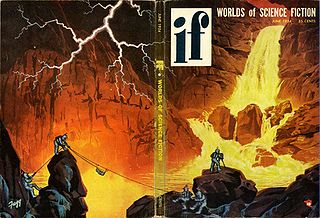
Fictional depictions of Mercury, the innermost planet of the Solar System, have gone through three distinct phases. Before much was known about the planet, it received scant attention. Later, when it was incorrectly believed that it was tidally locked with the Sun creating a permanent dayside and nightside, stories mainly focused on the conditions of the two sides and the narrow region of permanent twilight between. Since that misconception was dispelled in 1965, the planet has again received less attention from fiction writers, and stories have largely concentrated on the harsh environmental conditions that come from the planet's proximity to the Sun.
A setting is the time and geographic location within a narrative, either non-fiction or fiction. It is a literary element. The setting initiates the main backdrop and mood for a story. The setting can be referred to as story world or milieu to include a context beyond the immediate surroundings of the story. Elements of setting may include culture, historical period, geography, and hour. Along with the plot, character, theme, and style, setting is considered one of the fundamental components of fiction.
Worldbuilding is the process of constructing a world, originally an imaginary one, sometimes associated with a fictional universe. Developing an imaginary setting with coherent qualities such as a history, geography, and ecology is a key task for many science fiction or fantasy writers. Worldbuilding often involves the creation of geography, a backstory, flora, fauna, inhabitants, technology and often if writing speculative fiction, different races. This may include social customs as well as invented languages for the world.

Thomas Matthew McGrath, was a celebrated American poet and screenwriter of documentary films.
Selly Park is an affluent residential suburban district in south-west Birmingham, England. The suburb of Selly Park is located between the Bristol Road (A38) and the Pershore Road (A441).

Birmingham has a distinctive culture of art and design that emerged in the 1750s, driven by the historic importance of the applied arts to the city's manufacturing economy. While other early industrial towns such as Manchester and Bradford were based on the manufacture of bulk commodities such as cotton and wool, Birmingham's economy from the 18th century onwards was built on the production of finished manufactured goods for European luxury markets. The sale of these products was dependent on high-quality design, and this resulted in the early growth of an extensive infrastructure for the education of artists and designers and for exhibiting their works, and placed Birmingham at the heart of debate about the role of the visual arts in the emerging industrial society.

The literary tradition of Birmingham originally grew out of the culture of religious puritanism that developed in the town in the 16th and 17th centuries. Birmingham's location away from established centres of power, its dynamic merchant-based economy and its weak aristocracy gave it a reputation as a place where loyalty to the established power structures of church and feudal state were weak, and saw it emerge as a haven for free-thinkers and radicals, encouraging the birth of a vibrant culture of writing, printing and publishing.
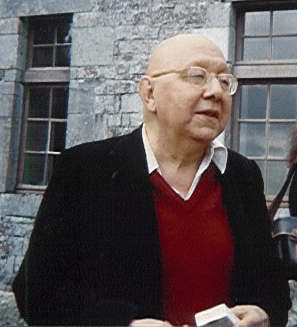
Cornelius Castoriadis was a Greek-French philosopher, social critic, economist, psychoanalyst, author of The Imaginary Institution of Society, and co-founder of the Socialisme ou Barbarie group.
References
- J. Russell Perkin (11 February 2014). David Lodge and the Tradition of the Modern Novel. MQUP. p. 116. ISBN 978-0-7735-9180-6.
- Maurice Charney (2005). Comedy: A Geographic and Historical Guide. Greenwood Publishing Group. p. 20. ISBN 978-0-313-32714-8.